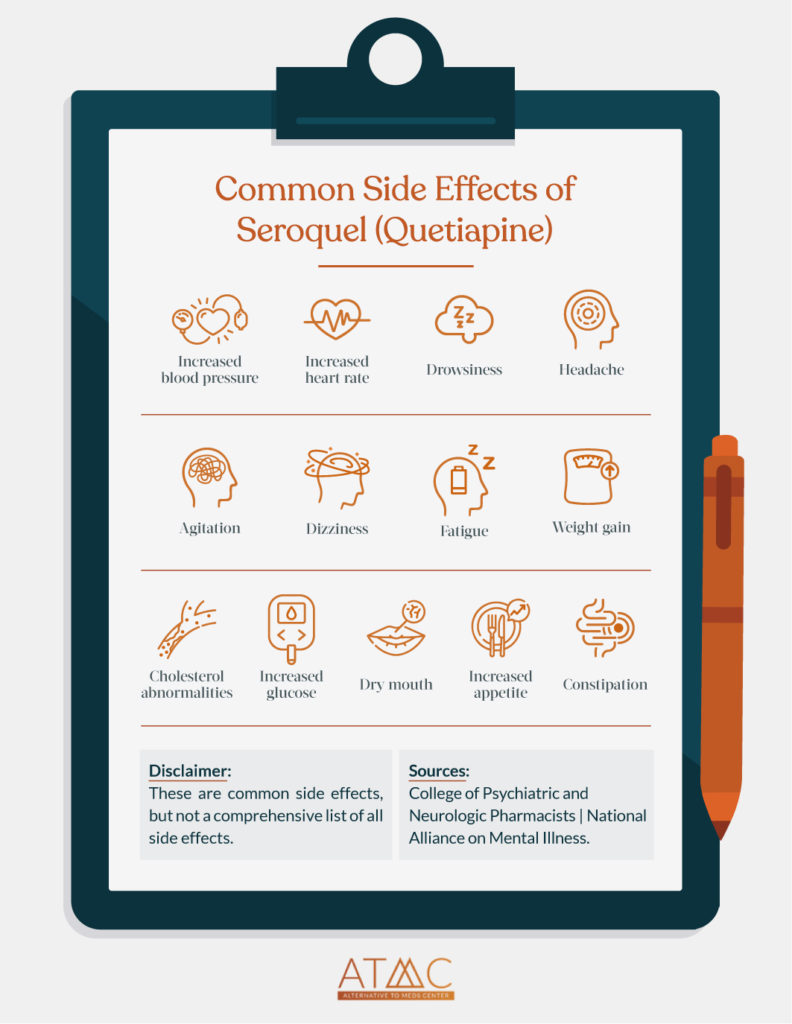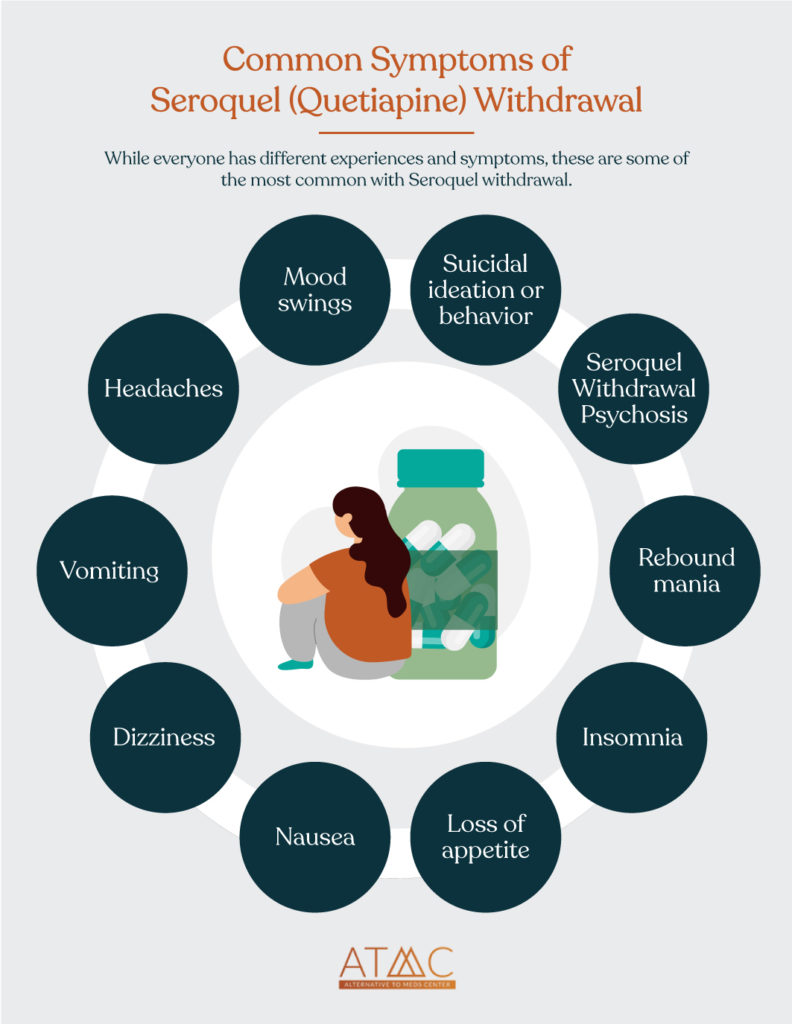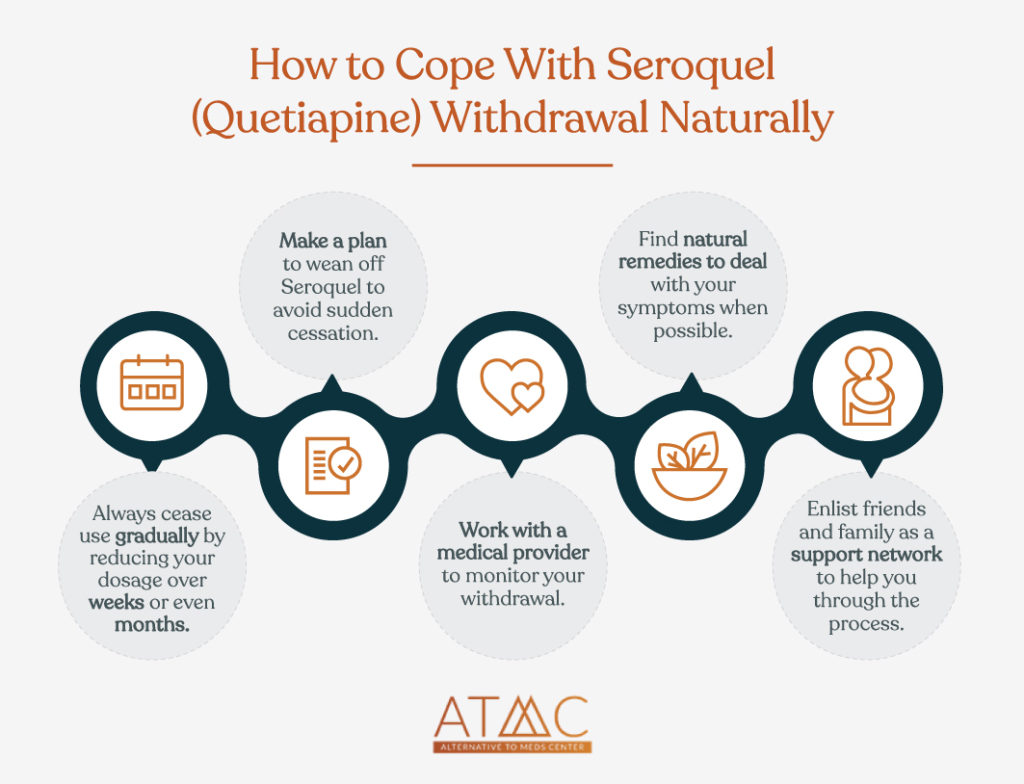Last Updated on September 17, 2022 by
Alternative to Meds Editorial Team
Medically Reviewed by Dr Samuel Lee MD
Seroquel withdrawal (quetiapine) may be part of a comprehensive treatment program using proven protocols for improved mental health naturally. Seroquel is a commonly prescribed antipsychotic medication used in the treatment of schizophrenia, and mania or depressive episodes of bipolar conditions. As is the case for most psychoactive medications, using Seroquel for several months or longer may lead to physical dependence.
If you or a loved one needs help to navigate Seroquel (quetiapine) withdrawal, this article provides useful information including details about Seroquel (quetiapine) withdrawal symptoms, treatment, withdrawal timeline, and resources for recovery.
Table of Contents:
What Is Seroquel?
Seroquel is an atypical antipsychotic drug available as a tablet or extended-release tablet. Its generic name is quetiapine. Seroquel is approved by the U.S. Food and Drug Administration (FDA) to treat schizophrenia and acute manic episodes, and as an adjunctive treatment for major depressive disorder.1
Aside from the FDA-approved guidelines, many off-label uses for Seroquel have developed such as for insomnia, PTSD, OCD, substance abuse and addiction, delirium, anxiety, depression (especially in those who have stopped seeing benefits from SSRIs), and personality disorders.2 We find a lot of people take Seroquel specifically as a sleep aid, usually at a low dose of 25-150 mg.
There have been reported uses of Seroquel by crushing and snorting, or used intravenously, sometimes in combination with cocaine.
Is Seroquel Addictive?
While it’s only available by prescription, quetiapine is not on the federal list of controlled substances. In general, it’s not considered addictive. However, a 2013 clinical study conducted on experimental rats by Chinese researchers found clear evidence that quetiapine has the potential to cause psychological dependence in animals.3
In addition, a number of individuals have self-reported a belief that they have become addicted to Seroquel, which is known on the street as “Susie-Q” or “quell.” 4
Seroquel (Quetiapine) Side Effects
There can be a wide range of side effects from this medication, from mild to moderate to severe. Not everyone experiences identical side effects of substance use, such as those listed here. Always discuss changes that occur while on Seroquel with your prescribing physician. The following is not a conclusive list of side effects; if you’re experiencing other reactions to Seroquel, consult your doctor or a medical professional.5
Common side effects could include:
- Vertigo/dizziness
- Abnormal physical weakness
- Nausea
- Constipation
- Appetite changes
- Weight gain
- Drowsiness/fatigue
- Dryness of the mouth
- Low sodium levels
- Nightmares
- Disturbed sleep
- Sleepwalking, sleep-driving, etc.*
- Lightheadedness
- Tachycardia (elevated heart rate at rest)
Less common, but more severe adverse effects should be carefully monitored and could include suicidality (ideation and behavior; especially noted in younger patients under age 25), tardive dyskinesia, tachycardia, movement disorders, involuntary repeating movements, tremors, cataracts in eyes, slowed heartbeat, sleep apnea, diabetes, abnormal liver function or liver failure, seizures, stroke (especially in elderly patients), pancreatitis, amnesia, hepatitis, and rarely, Neuroleptic Malignant Syndrome.
- Sleepwalking or other normal activities during sleep — sleep-driving, sleep shopping, sleep-texting, etc. — of which the person has no memory can also occur.
- High blood sugar, possibly extreme and associated with diabetic acidosis, coma, or death, has also been reported in patients treated with Seroquel.
Seroquel (Quetiapine) Withdrawal Symptoms
Stopping Seroquel abruptly will frequently evoke a wide range of withdrawal symptoms, generally referred to as Seroquel (Quetiapine) Discontinuation Syndrome.8 If the decision to come off Seroquel is made, stopping should never be done abruptly unless to avert a life-threatening reaction such as NMS. Always seek medical oversight and guidance for safety.
Even when slowly tapering off of the drug, there can still be some significant Seroquel withdrawal symptoms. These symptoms might be more severe if the patient took the medication for a very long time, and at high dosages. Our Seroquel tapering page goes into the nuances of tapering strategies based upon the duration of use. A list of just some of the reported Seroquel withdrawal symptoms follows.
Seroquel withdrawal symptoms may include:
- Suicidal ideation or behavior
- Seroquel Withdrawal Rebound Psychosis
- Rebound mania
- Psychotic symptoms that did not exist prior to taking antipsychotics
- Insomnia
- Hypersensitivity to light, sound, temperature, all sensory perceptions
- Vomiting
- Headaches
- Racing heart, tachycardia, hypertension
- Unusual mood swings that can change rapidly
- Loss of appetite
- Nausea
- Dizziness
- Anxiety
- Agitation
- Loss of concentration
- Depression
- Excessive sweating
- Dysphoric unease with life
- Some limited reports of withdrawal dyskinesia
Abrupt or fast Seroquel withdrawal can cause a rebound psychosis. Ample caution and patience for a slow withdrawal are warranted.
Everyone has a different set of withdrawal symptoms, and in that way, there is no one-size-fits-all description.
However, the most consistent symptoms we have seen at Alternative to Meds Center are:
- Seroquel Withdrawal Rebound Psychosis
- Rebound mania
- Insomnia
- Loss of appetite
Suddenly not sleeping, not eating, and acting manic when enduring Seroquel withdrawal is a sure sign that things are most likely going too fast and that the rate of withdrawal needs to be slowed down.
There are instances where people without prior psychotic symptoms experienced withdrawal psychosis when stopping neuroleptics such as Seroquel.
Seroquel Withdrawal Timeline
Seroquel withdrawal symptoms are different for everyone. Withdrawal can be broken into three phases: new withdrawal, rebound withdrawal, and Post-Acute Withdrawal Syndrome.
Phase 1: New Withdrawal
Studies indicate that most withdrawal symptoms occur during the first four weeks of stopping antipsychotic drugs.8 They often start one to four days after discontinuing medication and last up to six weeks, sometimes lessening during that period. Symptoms associated with cessation of quetiapine can include interruptions in sleep and insomnia, paresthesia (burning or prickling sensations), nausea, vomiting, diarrhea, dizziness, hypertension (high blood pressure), an increased heart rate, agitation, anxiety, sweating, anorexia, and myalgia. Though rare, movement disorders can emerge upon abrupt withdrawal of neuroleptic medications. Restlessness or hyperkinesia may last longer, sometimes months.6,7,25
Phase 2: Rebound Withdrawal
Rebound withdrawal can occur concurrently with or last beyond the new withdrawal phase.8 The symptoms exhibited in rebound withdrawal are understudied and can vary greatly from individual to individual. It may not always be clear unless a comprehensive patient history is available whether symptoms are newly emerging as a result of drug withdrawal, or whether pre-medication symptoms are recurring. Research has suggested that the symptoms in rebound withdrawal are frequently more severe than symptoms experienced pre-medication.23
Phase 3: Post-Acute Withdrawal Syndrome
Post-Acute Withdrawal Syndrome (PAWS) is a term used to describe withdrawal symptoms that can persist weeks or even months after discontinuing certain drugs.9 PAWS is thought to occur because virtually all drugs can cause physiologic and neuroadaptive changes. During drug use, the brain and CNS adapt to accommodate changes in available neurotransmitters. When you discontinue the drug, neurotransmitters can change again, increasing excitability or causing other reactions.
Symptoms can include things like irritability, anxiety, obsessive-compulsive behaviors, difficulty maintaining social relationships, pessimism, disturbed sleep patterns, and greater sensitivity to stress.9
How Long Does Seroquel Stay in Your System?
The half-life of Seroquel is six hours. Theoretically, it takes approximately six hours to clear 50 percent of the active drug from your system after you stop taking it and 24 to 48 hours to completely clear it after cessation.10
However, the body adapts to the presence of medications. The longer Seroquel is taken, the more adaptations are likely to develop. As a result, it may take considerably longer for your body to recalibrate back to pre-medication states and reverse the antipsychotic-induced dopamine supersensitivity or other neuroadaptive changes.
Changing neuroadaptive states, often called “Seroquel withdrawal syndrome,” can continue to plague patients for weeks, months, or even years. A precisely calibrated diet and supplement regimen can be designed to provide the essential neurotransmitter precursors needed to repair and normalize, and possibly shorten these after-effects.
Is It Safe To Quit Seroquel Cold Turkey?
Stopping Seroquel should rarely be done abruptly. In the vast majority of cases, antipsychotic withdrawal should be extremely gradual and attended with as much support as possible, including medical supervision, to help ease the person through to a successful outcome.
Abrupt cessation should only occur in rare cases where life-threatening reactions to the drug need to be controlled, such as NMS (neuroleptic malignant syndrome).5
Based on 15 years of experience, we suggest that Seroquel withdrawal be done with our team of health professionals in an inpatient setting to help navigate the complexities that may occur.
Does Seroquel Work Long-Term?
We are unable to find research demonstrating the long-term efficacy of antipsychotics like Seroquel.11 While Seroquel has an impressive ability to quickly thwart a psychotic event, and may even be life-saving in certain cases, the long-term use efficacy remains questionable.
Martin Harrow and colleagues recently published a study in the Feb 2021 edition of Psychological Medicine following patients with schizophrenia and schizoaffective psychosis for 20 years.12 Their results showed that those suffering from a severe mental illness who stopped taking medication within the first two years were six times more likely to recover than those who continued the antipsychotics.
It cannot be said that all people do better off of antipsychotics. However, the research presents a strong case for investigating safe alternatives to antipsychotics like Seroquel for long-term treatment of symptoms.
At Alternative to Meds Center, any persons wishing to undergo Seroquel withdrawal are screened for the probability of a successful outcome.
Treatments for Seroquel Withdrawal
If you or a loved one is considering a treatment program designed to help taper Seroquel safely, the protocols used at Alternative to Meds Center may be helpful to learn more about.
Each client’s program is designed within a holistic scientific context at our treatment center to carefully investigate root causes that may have contributed to your need for prescription medication in the first place.
Natural Remedies
Many symptoms of Seroquel withdrawal can be treated using natural methods. For instance, studies have shown that poor nutrition can lead to depression, and an improved diet can likewise improve mental health.16 Improving nutrition by reducing carbohydrates and adhering to a Mediterranean diet high in Omega-3 fatty acids and other vital nutrients have been clearly associated with improved mental health.24
Likewise, exercise has proven helpful in preventing depression.17,18 And yoga has been shown to decrease anxiety, depression, and stress significantly.19
Heavy metal toxicity testing and neurotoxin removal are fundamentals that may have been missed in earlier treatments. It is likely for many that toxicity played a role in symptoms for which no other reason was found to explain neurotransmitter imbalances.20 We have found that once the offending pollutants, chemical residues, heavy metals, food preservatives, industrial exposures, etc., have been isolated and gently purged, clients typically experience a resurgence in quality of sleep, appetite, energy, and mood.21
Knowing as much as possible about drugs like Seroquel, medication alternatives, side effects, and withdrawal is vital. This is why we offer a comprehensive education component in our programs.
Holistic Medicine
A comprehensive series of steps form a foundation for better health as a client moves through the Alternative to Meds Center program. You may never have been introduced to orthomolecular medicine, nebulized glutathione treatments, clay packs, infrared sauna, and many other gentle yet effective treatments we provide. We invite you to review our services page on the website to learn more about these and other therapies.
You may be surprised by how beneficial these holistic therapies can be. There are many such protocols used before, during, and after the taper is complete. Please contact us to find out more about our program and get answers to any specific questions you may have. Perhaps now is the time to look at a science-based, health-oriented program to assist you in your restorative health goals.
We invite you to learn more about our comfortable, inpatient, retreat-style facility, and how we may be able to help you move confidently toward sustainable and natural mental health. Please ask us all your other questions about Seroquel withdrawal, alternatives, side effects, and other information you may be interested in for yourself or a loved one.
Seroquel Withdrawal Success Stories & Videos
It takes a skilled professional to help navigate Seroquel withdrawal smoothly. Even if antipsychotic medications are warranted at the time of a crisis, it may not be necessary to endure the related debilitating side effects for a lifetime. According to some long-term research, many schizophrenic patients do better in the long run without antipsychotics.22
Alternative to Meds has been the expert on antipsychotic withdrawal for over 15 years. We have published evidence documenting our success. Often we find that patients were put on psychiatric meds for medical conditions, drug-induced psychosis, or other factors that have since changed. A person could have also been misdiagnosed.
This video is of a former schizophrenic who was treated at our center. It was found that his previous diagnosis and treatment did not lead to recovery. Instead, his issues were discovered to be food allergies complicated by recreational drug use. He came off of the medications and became an international speaker, helping others to understand the true components of mental health. This video was taken 10 years after his Alternative to Meds experience.












